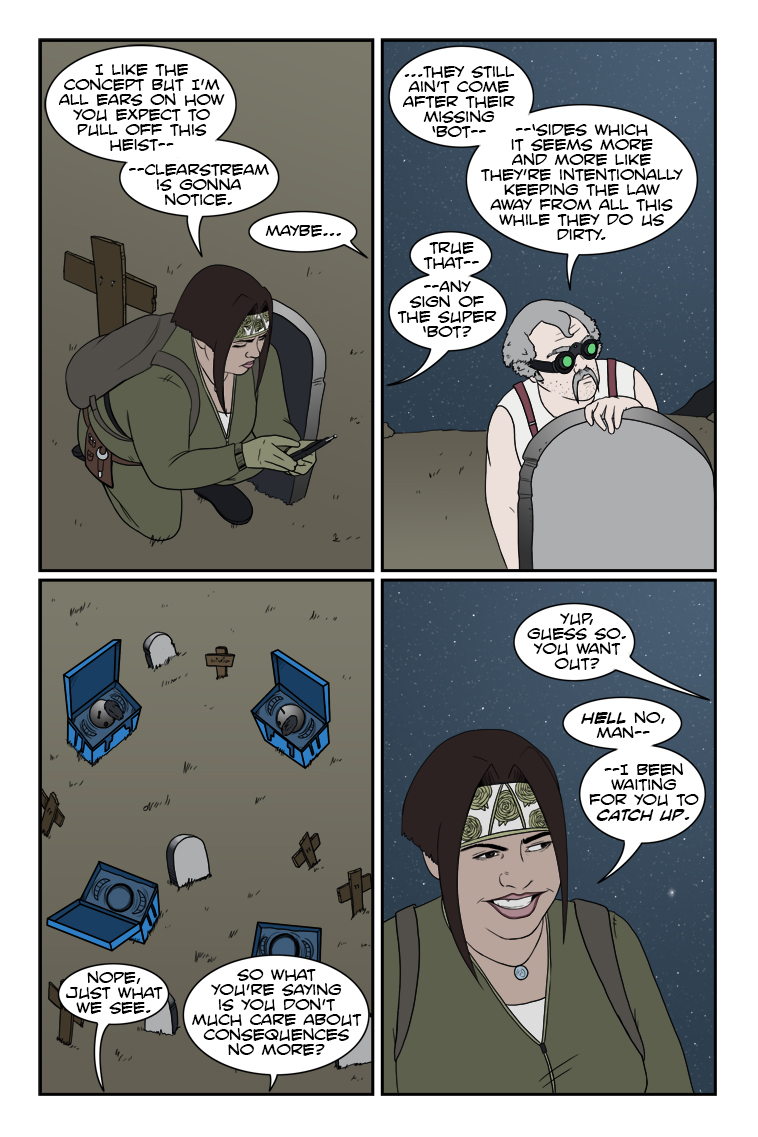Cart
Product categories
Support Us!
If you like what I do please support us on Ko-fi or Patreon.
Follow Us!
Join Our Newsletter!
Vote For Us!
Login
Polls
Events
-
Pasadena Comic Con
Dates: May 24
Location: Pasadena Convention Center, 300 E Green St, Pasadena, CA 91101, USA ( MAP)Details:We will be at the Pasadena Comic Con on January 26th. See some of you there for this one day event!
Purchase tickets online at here: https://www.tixr.com/groups/pcc/events/pasadenacomiccon-pasadena-comic-con-2025-115248
-
San Diego Comic Con: SP-N7
Dates: Jul 23 - 27
Location: San Diego Convention Center, 111 Harbor Dr, San Diego, CA 92101, USA ( MAP)Details:Clint & Dawn Wolf will be at San Diego Comic Con, as Lab Reject Studios. We will be at booth N7 in Small Press.









9 thoughts on “542 – Catching Up”
Keith
Some friction, but yeah. IRL, I’d like these two…they should have kids. 😉
Dawn
I might have to draw out what their kid would look like. First thought is that their kid would look like Ongo Gablogian from “It’s Always Sunny In Philadelphia”
Scarsdale
He’s pushing 60, she’s maybe 30, more likely less. Chuck is most likely shooting blanks, and besides, he’s talking to her like a baby sister than a love interest.
Keith
Up in these hills, sometimes family is all y’gots. 😉
ConcordBob
It is really hard to have a favorite character, as there are so many good ones. But I think Rosa is my favorite. Chuck is a good accomplice in sneaking work, but not much for romance. Uugh.
Otaku
I mean, if they don’t have at least an inkling of what’s going down, I’m actually disappointed in Clearstream. If anything, I’m starting to wonder if they caught on and realized “Wait, we can use this.”
Because of course they can. 😉
Dr. Norman (not a real doctor)
I’m way ahead of you – I’ve been waiting for you to catch up. From November 2020:
I would hope for nothing less – her and Chuck have the potential for a great deal of positive mischief.
Speaking of which, I received the email notifying me that my order for the NSFW “Chuck and Rosa Finally Do It” (age verification required) limited edition hardcover is going to be delayed due to the pandemic. I think it’s really cool that you’ll be adding some additional stretch goal goodies when it ships – thanks for all your story and art.
As for the inscription, ” We owe it all to you ” will be sufficient.
Crazyman
Partners in crime! 😈
TKG
A crime so perfect she went full on wall-eye!
Latest Comics
#565. 542 – Catching Up
70 Apr 09, 2025
#564. 541 – Graverobbers
61 Mar 19, 2025
#563. 540 – Trick Hello
39 Feb 26, 2025
#562. EPISODE TWENTY-THREE
9 Feb 24, 2025
#561. 539 – A Knife In The Dark (END OF EPISODE 22)
25 Dec 25, 2024
#560. 538 – Astute Paranoia
48 Dec 11, 2024
#559. 537 – Kooky And Spooky
64 Nov 20, 2024
#558. 536 – Great State Of Tech Sass
61 Oct 30, 2024
#557. 535 – Suzie Schadenfreude
62 Oct 16, 2024
#556. 534 – Compliments To The Cook
67 Sep 18, 2024
#555. 533 – Just Asking Questions
166 Sep 04, 2024
#554. 532 – Food For Naught
39 Aug 21, 2024
#553. 531- Inquisitional Etiquette
55 Jul 10, 2024
#552. 530 – After Dinner Stints
54 Jun 26, 2024
#551. 529 – Kitchen Gossip
93 Jun 12, 2024
#550. 528 – Snitches Get Glitches
110 May 29, 2024
#549. 527 – Rosa Ex Nihilo
276 Apr 24, 2024
#548. 526 – The Union Of The Sneak
77 Apr 10, 2024
#547. 525 – Creeping Suspicions
57 Mar 27, 2024
#546. 524 – Stopped Watch
88 Mar 06, 2024
Latest Chapters
Episode 22
Episode 21
Episode 20
Episode 19
Episode 18
Episode 17
542 – Catching Up
Now you're getting the idea, Chuck!
Calm before the storm.
Calendar
BlueSky Latest Posts
Writer’s Blog Archives